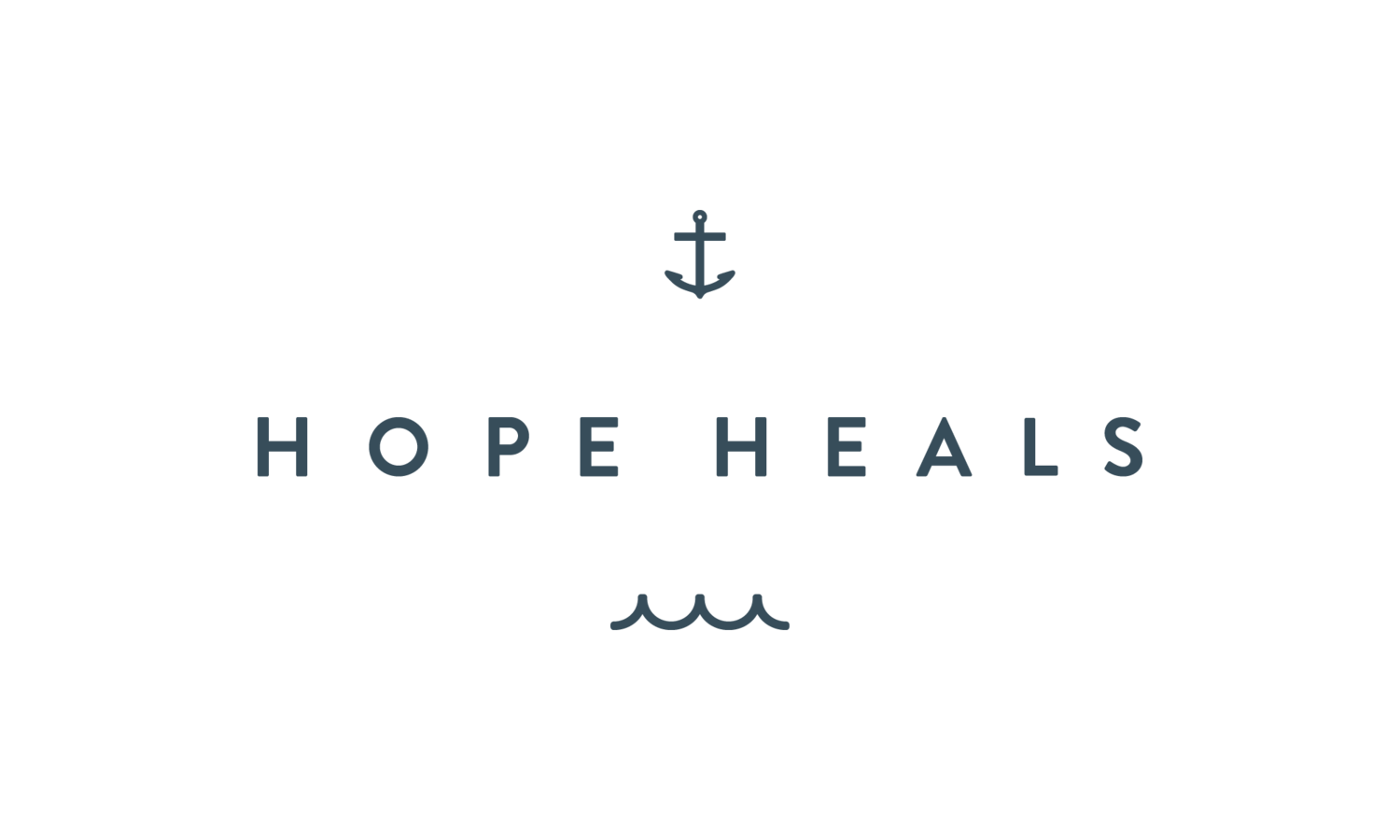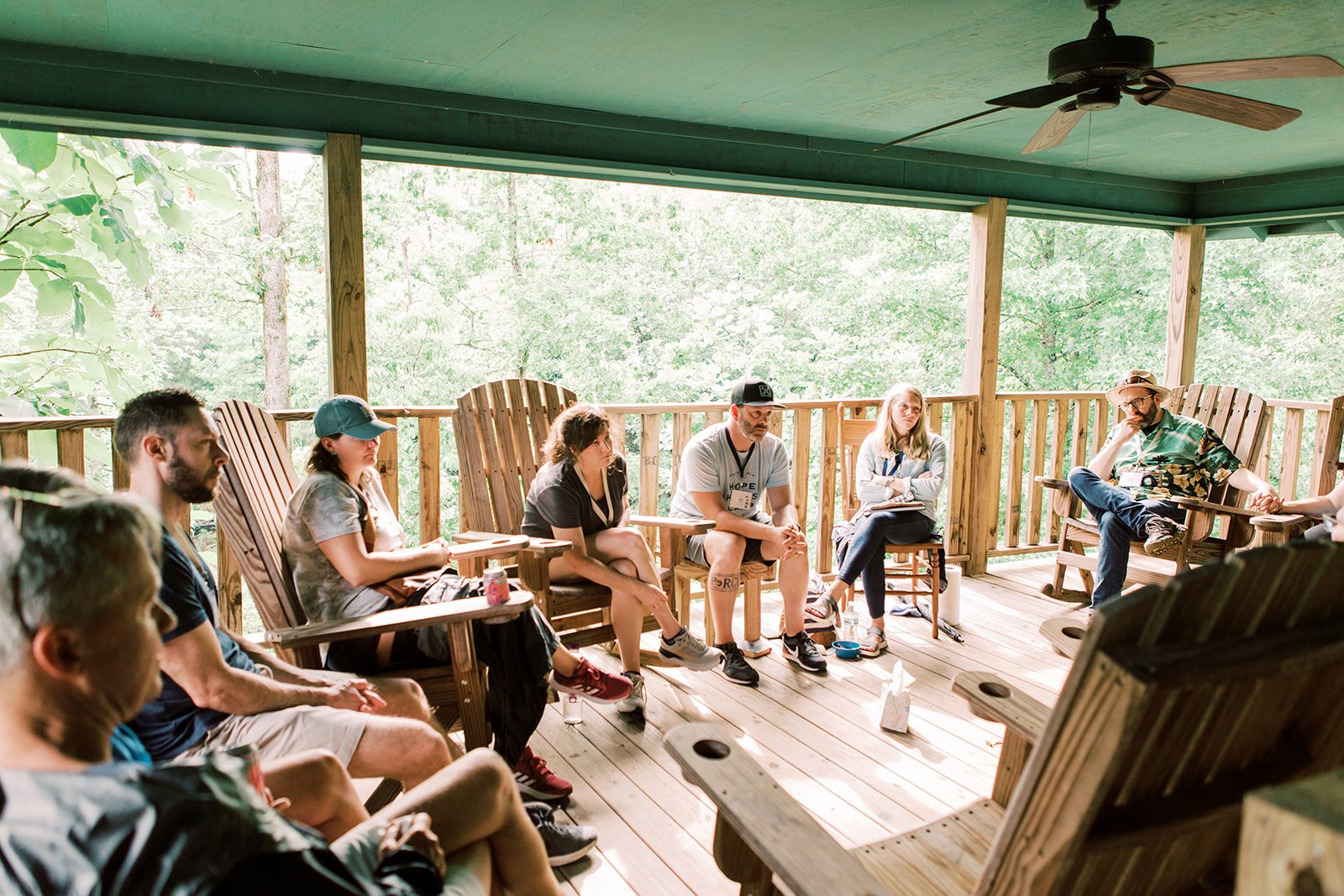Good/Hard Living
Greg and Jen Hill leading a parental grief discussion group at Hope Heals Camp. All images by Ashley Monogue.
We took a picture of the kids before heading down to the beach. Moppy-haired and still stretching their limbs from the long drive they stood like stair steps, gap-toothed and smiling.
As we got our first sight of the water, it all felt so overwhelmingly good. We were overjoyed at the sight of the beauty that is Lake Michigan. In light of the communal suffering that the last year has brought to the world, we did not need to see an ocean. Or even a mountain range. We did not need exotic. We just needed...different.
We waited until the summer season ended to avoid crowds and we found a humble, remote cottage that had private beach access so that it felt like we owned the beach that week. It was exactly the sort of vacation we needed, whether the pandemic had been happening or not. Slow and quiet, it was a week to ourselves with the time to look one another in the face and remind each other that maybe we’re going to be okay after all.
Believe it or not, the time away was made possible by high medical bills since we used travel points on our credit card to pay for the rented house. This seems fitting for the life we live. In true form we are grateful for the return on our investment in hardship.
Like everyone else in the world, we’ve been riding the waves of a pandemic. As everyone adjusted to the rapid changes over the last two years, we noticed that we seemed to instinctively view the pandemic and the necessary requirements of living in these times with a different perspective than some around us. Disability and trauma have a deep impact on a family, and that impact has proven useful in this season.
This is fair, after all. So much of life during COVID-19 is strangely familiar to us. We are used to having to rearrange our lives around disability and trauma, and a pandemic required some similar adjustments.
We carry a sense of surreality about our days. “What has happened here? I can’t recognize the landscape of our life any longer.”
We face a slew of inconveniences. “Yet another thing broken, lost, unavailable, unaffordable, unattainable.”
Limitations abound. “Can’t go there. Can’t do that. Can’t see them. Simply cannot manage that right now.”
Isolation as thick as my Southern-born husband’s gravy. “No church. No small group. No bible study. No youth group. No friends and no family.”
Angst and turmoil abound. We recognize the initial shock and can see the gaping wound left by the trauma of witnessing the unthinkable, the bitterness of altered relationships, and the loss of community as we knew it.
We entered this era a grieving people, and the wounds created by the pandemic are only adding to the brokenness we’ve already experienced.
This is the life we know; a life that is not scheduled or predictable and oftentimes out of our control. We fell into it like it was an old pair of shoes, warm and comfortable with age and familiarity, but yet also worn and tired, perhaps with a toe sticking out of the threadbare sole. We’ve been walking this road for a while and we would like a new pair of shoes, thank you very much.
At times, due to the differences in how people have responded to this COVID crisis, it has felt like we’ve been left behind in the suffering all over again. It’s not a popular thing to talk about and the discussion itself is fraught with tension, but I know many of us feel this right now; a sense that the people around us are moving on ahead, leaving us behind to swim in the deep waters of disability, trauma, and crisis alone.
As we’ve walked along this long, hard road of suffering, I have often reflected on the presence of tension.
We are living within a “good/hard life” and it’s possible to learn to embrace the joy and pain, all at once. It is a tension and these past two years have been taut with it.
Our trip to Michigan was like a demonstration of the good/hard life. We tried to thread the needle on safety and precaution, while also recognizing that our family needed to reach forward in joy and curiosity and find an outlet for all the stress and anxiety of the last seven years since a traumatic accident split our family history in two. The slow days on the beach were our attempt to reach for the good as we recognize all the hard around us. We held both. We’re all having to hold both right now.
I remind myself, and you, that there is space here for the grieving. This is an exceedingly hard time for everyone, and for some it is marked by the death of loved ones amidst a backdrop of continued, vast suffering. We see these losses for what they are: unspeakable trauma. We feel the weight of this year in our bodies and souls.
As case numbers continue to rise with a new variant, and cold weather settles in around us, we’re in for another long winter. We’re having to deliver more hard news to our children. Beloved fall traditions, holiday expectations, financial constraints...We’re going to face yet more disappointments in the remaining months of this year.
Yesterday, our nine-year old sat down at the door of my tiny office as I tried to make sense of our budget. He was not wearing his prosthetic legs, choosing instead to remain in comfortable clothes as he crawled through the house on his hands and knees.
He said he was feeling down. Tears filled his eyes.
“What’s the point of all of this, Mom? Do you ever feel sad and wonder why we’re even here?”
Heavy questions. I’ve come to expect this depth from his old soul, but the tears in his eyes were contagious. I felt the ache he was communicating. I know I can’t shield him from the pain and suffering this world brings. We’ve long ago had to reckon with that reality. The disappointments and losses will continue, and we’ve told him as much. But we’ve also, like broken records, reminded him, and each other, that we can reach for the good, too.
We can light the candles and have them shine bright over our simple, weekday dinner. We can sing songs in the kitchen. We can ask Alexa to tell us some dad jokes. We’ll do the potty dance and rejoice with the accomplishments of our toddler. We can cheer on our teenager as he forges ahead in his own interests. We’ll sing “Happy Birthday” and celebrate Advent.
We can look for the light. It’s there, after all, no matter how dim the surroundings may be.
Whether it’s the sand of Lake Michigan, the joy of the first snow, a bout of sadness, or another broken down appliance, we’ll hold all the tension, grief, and sorrow of these rough years, and we’ll look for the good. We’ll look back and acknowledge: yes, that was hard, but it was good, too. We see it in the eyes of one another and the fact that the sorrow itself points to a good that was lost.
Grief, after all, is acknowledgement of good in a strange, backwards sort of way.
We sometimes lose what is good and beautiful and true. So many of us have. It’s why this is all so good and hard in the first place.
Hold both today. It’s a challenge, living in this tension, but it’s the only way to really live...and we believe it’s the best way to live in a time of pandemic.






